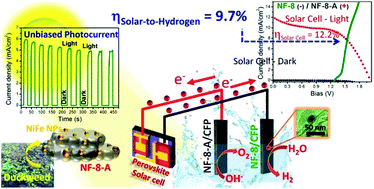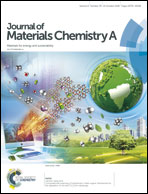High performance duckweed-derived carbon support to anchor NiFe electrocatalysts for efficient solar energy driven water splitting†
Abstract
Solar-energy-driven overall water splitting using sustainable energy resources is extremely desirable for high purity hydrogen fuel production, and one of the ways is to couple cost-effective solar cells in series with earth-abundant electrocatalysts for oxygen and hydrogen evolution reactions, OER and HER, respectively. Developing highly efficient and earth-abundant electrocatalysts however remains one of the grand challenges. Herein, we developed biomass (duckweed, DW) derived N,S-doped mesoporous carbon matrix supported NiFe-alloy nanoparticles (NPs) as efficient electrocatalysts for overall water splitting. While the annealed catalyst required 267 mV overpotential at 10 mA cm−2 for the OER, the best HER performance was demonstrated by the unannealed electrocatalyst requiring 106 mV at −10 mA cm−2 in 1 M KOH. For overall water splitting, this couple required only 1.61 V cell voltage to deliver 10 mA cm−2, with continuous release of O2 and H2 gas bubbles for more than 200 h. On integrating with perovskite solar cells, the homologous DW electrolyzer exhibited unassisted solar-energy-driven overall water splitting with a solar-to-hydrogen (STH) conversion efficiency of 9.7%.



 Please wait while we load your content...
Please wait while we load your content...